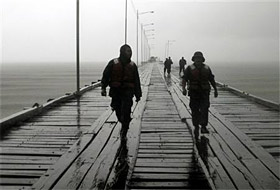 |
 |
 |
 News from Around the Americas | October 2005 News from Around the Americas | October 2005  
Hurricane Beta Slams Into Nicaragua's Jungle Coast
 Cyntia Barrera Diaz - Reuters Cyntia Barrera Diaz - Reuters


| | Nicaraguan soldiers walk along a dock reaching out into the Caribbean Sea from the coastal city of Puerto Cabezas as Hurricane Beta approached from the east October 29, 2005. (Reuters/Oswaldo Rivas) |
Puerto Cabezas, Nicaragua - Hurricane Beta slammed into Nicaragua's Caribbean coast early on Sunday, its powerful winds and rains pinning thousands of people inside flimsy shelters.

Beta lost some punch before making landfall and a late turn to the south spared the town of Puerto Cabezas from a direct hit but it was still a powerful Category 2 hurricane with winds of 110 mph (175 kph) and torrential rains.

In this normally sleepy fishing town in the remote jungle of northeast Nicaragua, residents and Miskito Indian evacuees from fishing villages rushed into makeshift shelters.

About 200 people crammed into one crumbling school with a rotting wooden frame and holes in its tin roof.

"We had a very bad night. The water leaked in, the children were cold. They brought us here without telling us anything. We don't have food or water," Norma Smith, a mother of six, said on Sunday morning.

Emergency officials said no deaths had been reported but Beta was expected to cut straight across Nicaragua, raising fears of lethal mudslides in mountainous areas even as it weakens.

Neighboring Honduras was also at risk and its government declared a national emergency, preparing to evacuate 125,000 people.

Both countries were ravaged in 1998 by Hurricane Mitch, whose heavy rains killed about 10,000 people across Central America. Earlier this month, Hurricane Stan killed up to 2,000 people in Central America when its rains caused mudslides. Most of Stan's victims were Guatemalan highland villagers.

"We are doing everything humanly possible," Nicaraguan President Enrique Bolanos said in a late night television and radio address.

Beta is the 13th hurricane and 23rd named storm of the relentless, record-breaking Atlantic season.

ISOLATED VILLAGES

Small fishing villages populated by Indian tribes like the Miskitos and descendants of escaped African slaves are strung along the Caribbean coast of Nicaragua and Honduras, one of Central America's most isolated areas.

Residents are traditionally wary of outsiders and officials were unable to persuade many to leave their homes.

"These people do not believe in danger until they really feel it," said Col. Mario Perez-Cassar, the head of Nicaragua's civil defense.

At 7 a.m. EST (noon GMT), Beta was hitting the coast about 75 miles south of Puerto Cabezas and moving southwest at 8 mph (13 kph).

The U.S. National Hurricane Center warned of storm surge flooding of up to 17 feet and said rains of 10 to 15 inches would hit Nicaragua and eastern Honduras with isolated maximum amounts of 25 inches possible.

In Honduras, residents rushed to supermarkets to buy basics and long lines formed at gasoline stations.

"Look at what happened with Mitch. There were no roads left then and food didn't arrive," said Pablo Leiva, 52, as he stocked up on canned food, grains and oil at a supermarket in the capital Tegucigalpa.

Beta earlier ripped roofs off homes on Colombia's small Caribbean island of Providencia, which along with neighboring San Andres was once a favored hideaway of famous 17th century Welsh pirate Henry Morgan. No deaths were reported.

Last week, Hurricane Wilma wrecked Mexico's Caribbean beach resorts, flooded Cuba and pounded southern Florida.

Additional reporting by Hugh Bronstein in Bogota, Gustavo Palencia in Tegucigalpa and Ivan Castro in Managua | 
 | |
 |



